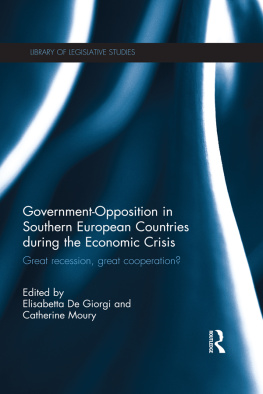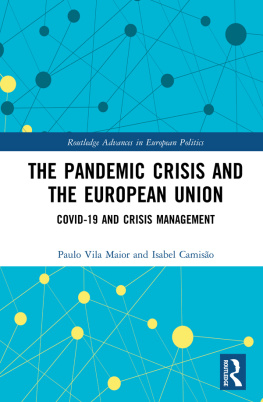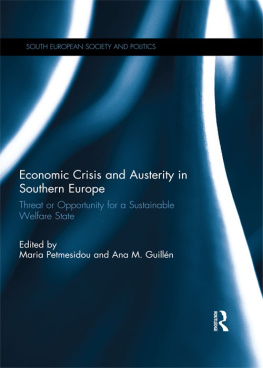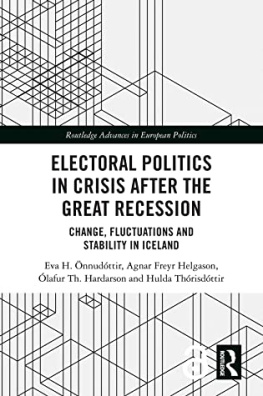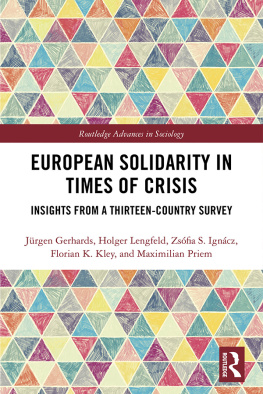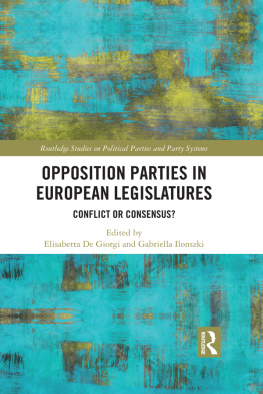Government-Opposition in Southern European Countries during the Economic Crisis
The international economic crisis has hit Europe, especially its periphery, remarkably hard, and has had deep consequences at economic and political levels. Since its onset, parties in parliament (especially those in opposition) have found themselves faced with a dilemma: choosing between the need to cooperate with the government in order to overcome the crisis and the opportunity provided by a weakened government to stress their adversarial position, so as to be more easily re-elected and possibly get into power. What have they decided to do? This is a crucial question, for which there is no easy or intuitive answer. The present volume introduces a collection of works exploring this dilemma in southern European countries, by examining the opposition behaviour in Greece, Italy, Portugal and Spain, and in the European Parliament. In so doing, we shall try to understand not only what kind of impact the crisis has had on the level of consensus in parliament in the four countries mentioned, but also whether differences are observable across cases.
This book was originally published as a special issue of The Journal of Legislative Studies.
Elisabetta De Giorgi is a Postdoctoral Fellow at the FCSH-NOVA University of Lisbon. Her main research interests are parliaments from a comparative perspective, in particular, parliamentary opposition and the law-making process. She has published several articles in national and international journals in Acta Politica, The Journal of Legislative Studies, Journal of Modern Italian Studies, Italian Political Science Review, South European Society and Politics, among others, and book chapters.
Catherine Moury is Assistant Professor at the FCSH-NOVA University of Lisbon. Her research focuses on institutional change in the EU and comparative policy-making. She has published in journals such as the European Journal of Public Policy, West European Politics and Party Politics. She is the author of Coalition Government and Party Mandate: How coalition agreements constrain ministerial action (Routledge, 2013) and Changing Rules of Delegation: A contest for power in comitology (with A. Hritier, C. Bischoff, C-F. Bergstrm, Oxford University Press, 2013).
Library of Legislative Studies
Edited by Lord Philip Norton of Louth, University of Hull, UK.
National Parliaments and the European Union
Edited by Philip Norton
The New Parliaments of Central and Eastern Europe
Edited by David M. Olson & Philip Norton
Members of Parliament in Western Europe
Edited by Wolfgang C. Muller & Thomas Saalfield
The New Roles of Parliamentary Committees
Edited by Lawrence D. Longley & Roger H. Davidson
Conscience and Parliamant
Edited by Philip Cowley
Parliaments & Governments in Western Europe
Edited by Philip Norton
Parliaments and Pressure Groups in Western Europe
Edited by Philip Norton
Parliaments in Asia
Edited by Philip Norton & Nizam Ahmed
The Uneasy Relationship between Parliamentary Members and Leaders
Edited by Lawrence D. Longley & Reuven Yair Hazan
Delegation and Accountability in European Integration
Edited by Torbjorn Bergman & Erik Damgaard
Second Chambers
Edited by Nicholas Baldwin & Donald Shell
Parliaments and Citizens in Western Europe
Edited by Philip Norton
The Rise of the Norwegian Parliament
Edited by Hilmar Rommetvedt
The Unseen Hand
Edited by Rinus van Schendelen & Roger Scully
The Scottish Parliaments
Edited by David Arter
From Legislation to Legitimation
The Role of the Portuguese Parliament
Edited by Cristina Leston-Bandeira
Cohesion & Discipline in Legislature
Edited by Reuven Y. Hazan
Southern European Parliaments in Democracy
Cristina Leston-Bandeira
Executive Leadership & Legislative Assemblies
Edited by Nicholas Baldwin
The Europeanisation of Parliamentary Democracy
Edited by Katrin Auel and Arthur Benz
Comparing and Classifying Legislatures
Edited by David Arter
The Peoples Congresses and Governance in China
Toward a Network Mode of Governance
Edited by Ming Xia
Post-Communist and Post-Soviet Parliaments
The Initial Decade
Edited by Philip Norton and David M. Olson
The Internet and Parliamentary Democracy in Europe
A Comparative Study of the Ethics of Political Communication in the Digital Age
Edited by Xiudian Dai and Philip Norton
Parliamentary Opposition in Old and New Democracies
Edited by Ludger Helms
Post-Communist Parliaments
The Second Decade
Edited by David M. Olson and Gabriella Ilonszki
Ceremony and Ritual in Parliament
Edited by Shirin M. Rai
The Roles and Function of Parliamentary Questions
Edited by Shane Martin and Olivier Rozenberg
Post-Communist Parliaments
Change and Stability in the Second Decade
Edited by David M. Olson and Gabriella Ilonszki
Parliaments and Citizens
Edited by Cristina Leston-Bandeira
Legislatures of Small States
A Comparative Study
Edited by Nicholas D. J. Baldwin
Parliamentary Communication in EU Affairs
Connecting with the Electorate?
Edited by Katrin Auel and Tapio Raunio
Government-Opposition in Southern European Countries during the Economic Crisis
Great Recession, Great Cooperation?
Edited by Catherine De Giorgi and Catherine Moury

